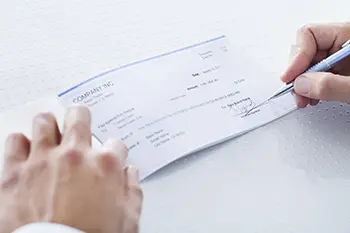
A cheque issued by you can be dishonoured by the bank for various reasons. There could be an overwriting on the cheque, which makes the cheque invalid. Alternatively, there could be a mismatch between the master signature in the bank records and your signature on the cheque. The third case is where normally legal recourse comes into the picture and that is where the cheque is dishonoured due to insufficient funds in your bank account.
Most of us focus on the legal implications of a cheque bounce but there are three very clear issues you need to understand here.
When the cheque issued by you bounces, there is a reputational issue with banks and clients which is normally more important than the legal issue. The legal process moves slowly and there are more than 45 lakh cheque bounce cases pending with courts. But here is what you can do in your own interest; partly prophylactic and partly therapeutic.
When the cheque dishonor is due to technical issues like overwriting or signature mismatch, you must make an effort to immediately rectify the issue. Ideally, you can agree to do a NEFT / RTGS transfer to your client so that business relations are maintained.
There is a debate on whether stopping a cheque would amount to dishonour. If the balance in your account on the pay date is less than the amount of the cheque, then the bank will treat the stop payment also as cheque dishonour.
The cheque dishonour problem must be addressed at multiple levels. Firstly, your online banking account reveals if your account is short-funded. You have 4-5 hours at your disposal to fund your account appropriately. This protects your credit standing.
When the cheque gets dishonoured, the first step must be to proactively inform the payee of the cheque and compensate them immediately along with bank penalty. In case, you are in genuine financial crunch, you can be frank with the payee and ask them for more time. Remember, cheque dishonour still has credit rating implications.
Most business people prefer to settle cheque dishonour cases outside the court. In case, the payee threatens you with legal consequences, reason with them for an out-of-court settlement. Most people agree as long as their business is not impacted.
If the payee does issue a legal notice, he/she is obliged to give you 30-days notice to pay the money. It is in your interest to pay up the sum to the payee within the grace of 30 days so that you can protect your reputation and avoid legal hassles.
If the case finally does go to court, it can drag for a long time. But the reputational damage can be substantial. Typically, lawyers will give both of you one more opportunity to settle the case amicably, which is mostly in mutual interest.
A civil suit for cheque dishonour is only possible where the liability can be established. Similarly, criminal case is possible only when the intention to cheat or defraud the payee can be proved. But the biggest risk in cheque dishonour is not legal consequences. It is more about reputation and your credit standing. That is what you must strive to protect
![]() IIFL Customer Care Number
IIFL Customer Care Number
(Gold/NCD/NBFC/Insurance/NPS)
1860-267-3000 / 7039-050-000
![]() IIFL Capital Services Support WhatsApp Number
IIFL Capital Services Support WhatsApp Number
+91 9892691696
IIFL Capital Services Limited - Stock Broker SEBI Regn. No: INZ000164132, PMS SEBI Regn. No: INP000002213,IA SEBI Regn. No: INA000000623, SEBI RA Regn. No: INH000000248, DP SEBI Reg. No. IN-DP-185-2016, BSE Enlistment Number (RA): 5016
ARN NO : 47791 (AMFI Registered Mutual Fund & Specialized Investment Fund Distributor), PFRDA Reg. No. PoP 20092018

This Certificate Demonstrates That IIFL As An Organization Has Defined And Put In Place Best-Practice Information Security Processes.